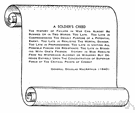creed
Also found in: Thesaurus, Acronyms, Encyclopedia, Wikipedia.
creed
(krēd)n.
1. A formal statement of religious belief; a confession of faith.
2. A system of belief, principles, or opinions: laws banning discrimination on the basis of race or creed; an architectural creed that demanded simple lines.
[Middle English crede, from Old English crēda, from Latin crēdō, I believe; see credo.]
American Heritage® Dictionary of the English Language, Fifth Edition. Copyright © 2016 by Houghton Mifflin Harcourt Publishing Company. Published by Houghton Mifflin Harcourt Publishing Company. All rights reserved.
creed
(kriːd)n
1. (Ecclesiastical Terms) a concise, formal statement of the essential articles of Christian belief, such as the Apostles' Creed or the Nicene Creed
2. (Ecclesiastical Terms) any statement or system of beliefs or principles
[Old English crēda, from Latin crēdo I believe]
ˈcreedal, ˈcredal adj
Creed
(kriːd)n
(Biography) Frederick. 1871–1957, Canadian inventor, resident in Scotland from 1897, noted for his invention of the teleprinter, first used in 1912
Collins English Dictionary – Complete and Unabridged, 12th Edition 2014 © HarperCollins Publishers 1991, 1994, 1998, 2000, 2003, 2006, 2007, 2009, 2011, 2014
creed
(krid)n.
1. an authoritative formulated statement of the chief articles of Christian belief.
2. an accepted system of religious or other belief.
[before 1000; Middle English crede, Old English crēda < Latin crēdō I believe; see credo]
Random House Kernerman Webster's College Dictionary, © 2010 K Dictionaries Ltd. Copyright 2005, 1997, 1991 by Random House, Inc. All rights reserved.
ThesaurusAntonymsRelated WordsSynonymsLegend:
Switch to new thesaurus
| Noun | 1. |  creed - any system of principles or beliefs creed - any system of principles or beliefstestament - a profession of belief; "he stated his political testament" doctrine, ism, philosophical system, philosophy, school of thought - a belief (or system of beliefs) accepted as authoritative by some group or school Athanasian Creed - a Christian profession of faith |
| 2. |  creed - the written body of teachings of a religious group that are generally accepted by that group creed - the written body of teachings of a religious group that are generally accepted by that grouporiginal sin - a sin said to be inherited by all descendants of Adam; "Adam and Eve committed the original sin when they ate the forbidden fruit in the Garden of Eden" doctrine, ism, philosophical system, philosophy, school of thought - a belief (or system of beliefs) accepted as authoritative by some group or school confession - the document that spells out the belief system of a given church (especially the Reformation churches of the 16th century) ahimsa - a Buddhist and Hindu and especially Jainist doctrine holding that all forms of life are sacred and urging the avoidance of violence ecumenicalism, ecumenicism, ecumenism - (Christianity) the doctrine of the ecumenical movement that promotes cooperation and better understanding among different religious denominations: aimed at universal Christian unity Immaculate Conception of the Virgin Mary, Immaculate Conception - (Christianity) the Roman Catholic dogma that God preserved the Virgin Mary from any stain of original sin from the moment she was conceived Incarnation - (Christianity) the Christian doctrine of the union of God and man in the person of Jesus Christ Nicene Creed - (Christianity) a formal creed summarizing Christian beliefs; first adopted in 325 and later expanded real presence - (Christianity) the Christian doctrine that the body of Christ is actually present in the Eucharist |
Based on WordNet 3.0, Farlex clipart collection. © 2003-2012 Princeton University, Farlex Inc.
creed
noun belief, principles, profession (of faith), doctrine, canon, persuasion, dogma, tenet, credo, catechism, articles of faith The centre is open to all, no matter what race or creed.
Collins Thesaurus of the English Language – Complete and Unabridged 2nd Edition. 2002 © HarperCollins Publishers 1995, 2002
creed
nounA system of religious belief:
The American Heritage® Roget's Thesaurus. Copyright © 2013, 2014 by Houghton Mifflin Harcourt Publishing Company. Published by Houghton Mifflin Harcourt Publishing Company. All rights reserved.
Translations
عَقيدَه، مَذْهَب
krédovíravyznánívyznání víry
livsopfattelseoverbevisningtro
oppiusko
apostoli hitvalláshitvallás
trúarjátning
pažiūros
kredopārliecībaticība
credogeloofsbelijdenis
vyznanie viery
dinsel inançlaritikat
creed
[kriːd] N (= religion) → credo m, religión f; (= system of beliefs) → credo mthe Creed (Rel) → el Credo
Collins Spanish Dictionary - Complete and Unabridged 8th Edition 2005 © William Collins Sons & Co. Ltd. 1971, 1988 © HarperCollins Publishers 1992, 1993, 1996, 1997, 2000, 2003, 2005
Creed
[ˈkriːd] nthe Creed (in Mass) → le Credo
creed
[ˈkriːd] n (= religious belief) → croyance f
(= principles) → philosophie f
Collins English/French Electronic Resource. © HarperCollins Publishers 2005
creed
Collins German Dictionary – Complete and Unabridged 7th Edition 2005. © William Collins Sons & Co. Ltd. 1980 © HarperCollins Publishers 1991, 1997, 1999, 2004, 2005, 2007
Collins Italian Dictionary 1st Edition © HarperCollins Publishers 1995
creed
(kriːd) noun (a short statement of) one's (especially religious) beliefs.
Kernerman English Multilingual Dictionary © 2006-2013 K Dictionaries Ltd.